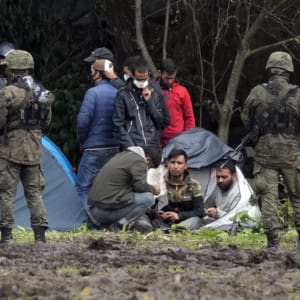I met Andrzej in 2012 in Grodno while making a documentary about the lives of Poles in Belarus.
“You come from near Narocz. Those are well-known regions. Kmicic’s division fought there,” he told me as he greeted me. He was referring to the Polish Home Army (AK) lieutenant Antoni Burczyński (codename: Kmicic) who was the commander of the first partisan division in the Vilnius region. Burczyński was tricked and murdered by the Soviets in 1943.
Few people have known the history of the Eastern parts of the Second Polish Republic as well as Andrzej Poczobut does. People like him are often called “walking encyclopedias.” He has military maps in his head, as well as the names of the many Polish heroes who gave their lives to protect their lands. Poczobut not only remembers this but for many years, he has cared and protected these memories, and worked to make sure they are not erased by Alexander Lukashenko’s regime.
The dictator Lukashenko has been trying to Russianize Belarus since the start of his regime. Meanwhile, Andrzej has been fighting for years for not only historic truth but also the Polish language, culture, and identity in Belarus.
Since the beginning, Poczobut has believed that the Union of Poles in Belarus (ZPB) should be a non-governmental organization. This is why in 2005, following a schism organized by the authorities in Minsk, he sided with the brave activists who continued their work despite repressions. He paid a heavy price for this and was arrested after the 2010 presidential elections when the regime struck at the “insubordinate” Poles during attempts to pacify the democratic opposition. After being released, he continued his work.

Poczobut has criticized Lukashenko’s dictatorship in independent Belarusian media and Poland’s Gazeta Wyborcza. Due to this, he has often been accused of defaming Lukashenko.
Following the August 2020 protests in Belarus, Poczobut was one of the most frequent commentators in Polish media. He reported about the increasingly dire situation in Belarus from the country itself. The number of political prisoners and Belarusians forced to migrate was growing, and independent media and organizations were being shut down. Andrzej had no doubts that the time to deal with Poles would also come.
That time came quicker than even he expected. He has been imprisoned since March 25, 2021. The authorities accused him and ZBP head Angelika Borys of “inciting hatred based on national identity.” They face up to over a dozen years in the labor camps. The accusations were completely fabricated, and the whole affair was made up by Belarusian authorities.
Despite the wave of repressions, Andrzej not only did not flee the country, he also refused freedom under the condition that he would leave Belarus (at the end of May 2021, three Polish minority activists were released from prison at Kazakhstan’s behest). Three times, Minsk authorities suggested that Poczobut write a letter pleading for a pardon — he refused each time.
“In situations such as mine, such behavior would be immoral and unworthy of the memory of Home Army soldiers,” he wrote in one of his letters concerning the matter. Poczobut is well aware that he is risking indefinite imprisonment in a labor camp.
Lukashenko’s propaganda declares that Poczobut will have to wait a long while for another opportunity to be pardoned.
Meanwhile, Poczobut would rather sit in inhumane conditions in prison than betray his convictions and values. Lukashenko’s regime hates people like him the most and focuses its ire against them in particular.
Is it easy for Andrzej to make such a decision when his wife and children wait for him back home? Of course not. Yet he understands that if Belarusian authorities force out people like him and Andżelika Borys, then all there will be to remind people of Poland in Belarus will be tombstones and memorial plaques in churches — provided Lukashenko’s regime doesn’t take those down as well.
Andrzej Poczobut is a hero from a different time. It is rare to come across such bravery today.






